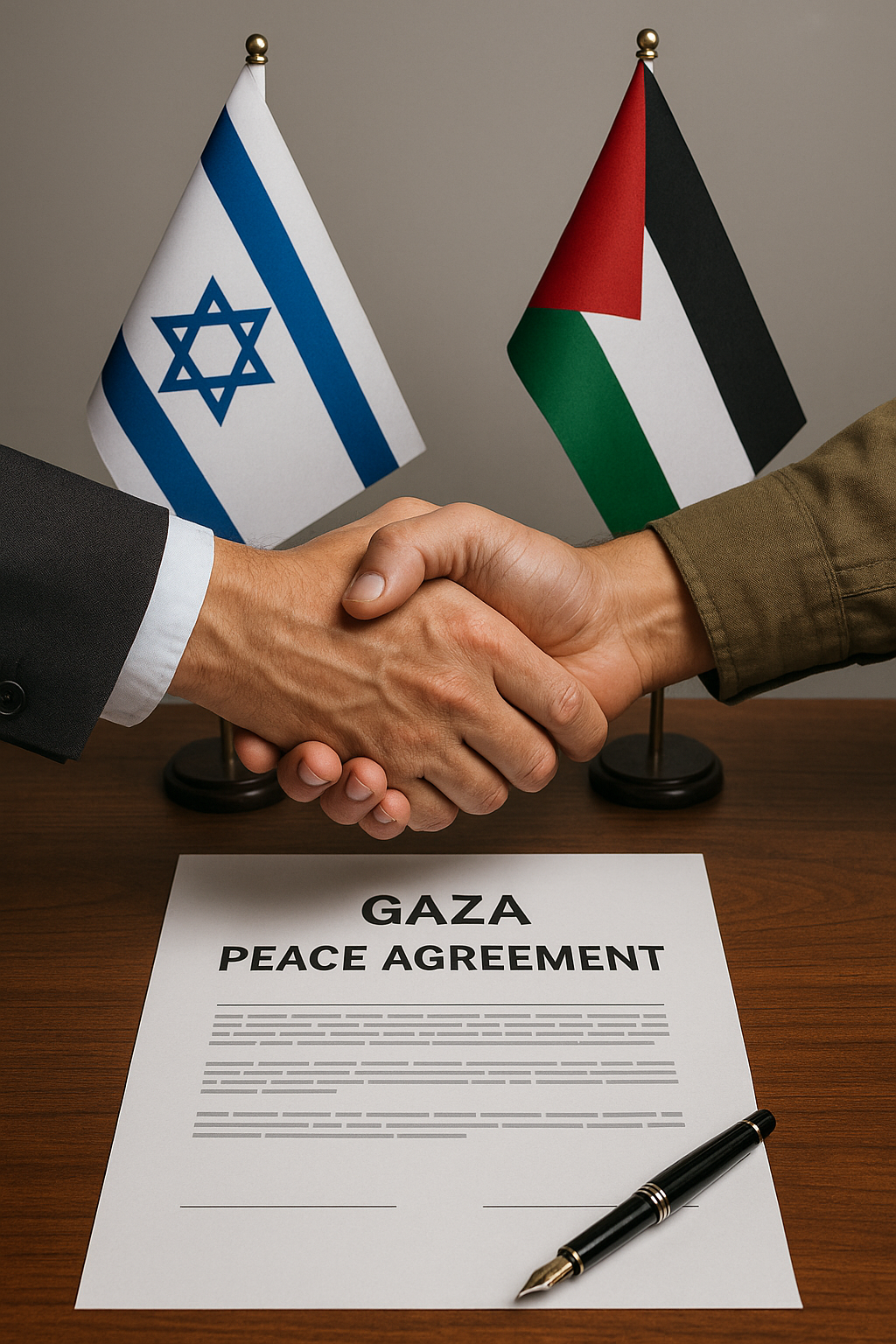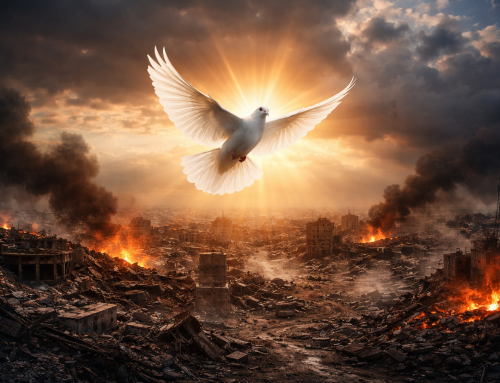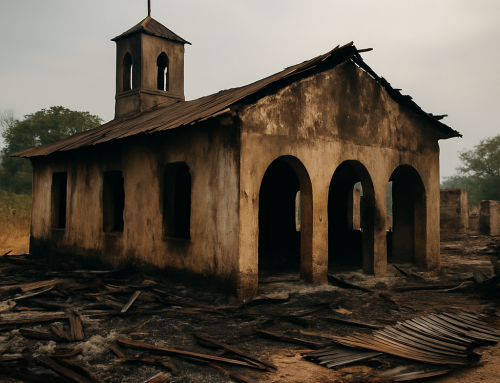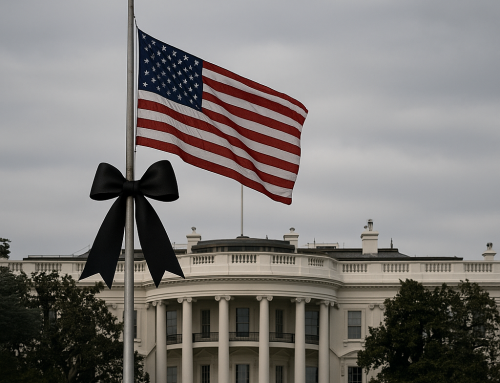A Fragile Hope: Meditations on the Gaza Agreement
Today, October 13, 2025, we see on the horizon a glimpse of truce in the midst of a wounded land.
A peace agreement (or at least a first step toward a cessation of hostilities) has been signed between Israel and Hamas, with the diplomatic support of the United States, Egypt, Qatar, and Turkey. As Christians, we cannot be satisfied with a mere ceasefire as if it were the final word, nor can we ignore the wounds that remain open.
The Scenario: What the Agreement Says
Here are some key elements emerging from the most reliable sources (particularly Reuters):
The ceasefire came into effect on October 12, 2025, at 19:14 UTC.
The agreement provides for the gradual withdrawal of Israeli forces to predetermined lines, and for the opening of a humanitarian corridor to allow the flow of aid (food and medicine) into Gaza.
Part of the agreement includes a prisoner exchange: Israel will release about 250 Palestinian detainees (including some serving life sentences) along with 1,700 other prisoners, while Hamas will release the 20 remaining Israeli hostages still alive (within 72 hours of the withdrawal).
The return of the bodies of the deceased hostages is also expected within the same 72 hours, in accordance with the terms of the treaty.
•The full success of the agreement, however, is conditional: Hamas must relinquish its de facto power over Gaza, and a technical government or international supervision will have to assume administrative roles, with the prospect that the Palestinian Authority will resume a governing role in the territory.
• Some points remain unclear or controversial, including the issue of Hamas’s disarmament, the composition and actual authority of the transitional body, and the assurance that the agreement is not merely a “temporary armistice” lacking effective sanctions in case of violations.
•The United Nations Secretary-General, António Guterres, has welcomed the agreement as a potential step toward the realization of a Palestinian state, urging all parties not to miss the diplomatic window that has been created.
Many similar agreements in this region have collapsed because the security provisions were not respected. If either side violates the ceasefire, or if new tensions erupt, we could soon find ourselves back at war.
Even with a technical government or international supervision, if Hamas retains weapons and influence in the shadows, peace will remain fragile. A military apparatus that has not been dismantled can always be reactivated.
After years of death, destruction, and suffering, both the Israeli and Palestinian peoples have lost faith in the so-called “peace process.” The unfulfilled promises of the past weigh like stones.
We cannot ignore the suffering endured on both sides: families who have lost children, homes destroyed, indelible trauma. Peace that does not acknowledge pain is unstable peace. True peace is not the absence of conflict, but the presence of justice.
Some leaders will try to exploit the agreement for triumphalist proclamations. We, as Christians, must remain vigilant so that they do not turn the “ceasefire” into a trophy, forgetting the poor, the wounded, and the refugees.
If there is something we can offer as a Christian community, and as individual believers, it is this:
Pray with a sincere heart: “Lord, let this agreement not be a dagger twisting within the truce, but a bridge leading to reconciliation.”
Be peacemakers in our own small contexts: promote dialogue, not hatred; teach mercy; and remember that every human being, Palestinian or Israeli, is created in the image of God.
• • Support humanitarian work: not through media spectacles, but through humble service — food, care, rebuilding. The beautiful images of the signatures matter far less than the brick that rebuilds a home, or the face that learns to smile again.
– Be vigilant and let the truth shine: if injustices arise, we must not remain silent. The true Christian is not a weather vane of power, but a voice of conscience calling for justice, forgiveness, and truth.
Oggi possiamo guardare al cielo con un filo di speranza: un accordo è stato firmato, le armi dovrebbero tacere per un momento, ostaggi hanno una chance di tornare a casa. Ma questa speranza non è ingenua. È temperata. È vigilante. È pregna di consapevolezza che nulla di buono resta stabile senza radici profonde nella giustizia di Dio.
As Billy Graham once said (and we could echo his words): “Peace is not a destination, but a journey we walk, step by step, with a contrite heart, an alert mind, and outstretched hands.”
May our prayer today not be merely “Peace, peace,” but: “Lord, make this peace real, lasting, and liberating.”
We know that without the Prince of Peace, Jesus Christ, every human attempt will fall into emptiness. Yet we choose to believe, trusting in our Lord Jesus Christ, the Prince of Peace, and in Him we thank God for having intervened to grant a truce—one we hope will endure. Let us remember the words of the Apostle Paul: “While people are saying, ‘Peace and safety,’ destruction will come on them suddenly, as labor pains on a pregnant woman, and they will not escape.” But today, in prayer, we thank our God, surrendering ourselves into the mighty hands of His Divine Wisdom and will. May God bless Israel, Palestine, and the entire world.
Francesco Pastone






